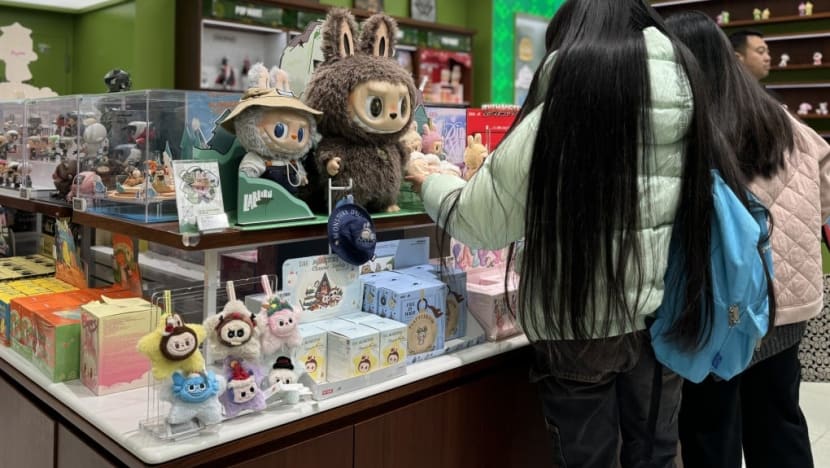How 'made in China' became trendy, thanks to Labubu toy's �鶹��ý-wide success
Pop Mart toys are gaining global recognition for their unique designs and brand power.

Customers select Labubu toys at a Pop Mart store in Shanghai on Dec 17. (Photo: SCMP/Mandy Zuo)

This audio is generated by an AI tool.
What was the hottest toy in �鶹��ý this year? For many, the answer is a quirky, rubber-coated plush character with pointy ears, devilish eyes, jagged teeth and a mischievous grin.
Labubu, designed by Hong Kong-born Kasing Lung and made by Pop Mart, China’s leading retailer of trendy toys, has captured the hearts of fans across the continent with its unusual and eye-catching design.
Pop Mart, the “largest and fastest-growing enterprise in the trendy toy industry” according to a report by Guosen Securities released at the end of last month, has witnessed double-digit sales growth in China and triple-digit growth in international markets in the past year.
Labubu and other mystery collectables, often kept in sealed packaging known as blind boxes, are helping to reshape the global perception of “made in China” products. Instead of being seen as cheap, mass-produced items, the toys are gaining global recognition for their unique designs, brand power, and their ability to tap into emerging consumer trends.
At a Pop Mart store in Shanghai’s Xuhui district, one customer said she had finally managed to buy a Labubu set after months of waiting.
“I could never get one when the stock was replenished online because so many people rushed to buy at the same time,” she said. “Today, I finally got one at an official store, and I’m so happy!”
When asked why she loved the toy, the young woman said: “I love the design; I feel happy when looking at it.”
While demand for Labubu, the flagship toy in Pop Mart’s collection, has outstripped supply in China, it has also become a sensation in other parts of �鶹��ý as well.
In April, Lisa, a Thai member of the popular K-pop group Blackpink, posted a photo of herself online cuddling a Labubu doll that also showcased a Labubu keychain on her bag. That sparked a surge in the toy’s popularity in Thailand that quickly spread to Vietnam, Singapore and beyond.
Pop Mart’s third-quarter business update showed that the company’s overall revenue grew by between 120 and 125 per cent year on year. Revenue in mainland China increased by between 55 and 60 per cent, while revenue from Hong Kong, Macau, Taiwan and international markets grew by between 440 and 445 per cent.
Related:
Pop Mart’s toys are often packaged in blind boxes to spark curiosity and excitement among consumers, but they are not cheap. A set of six small Labubu figures, each in a different pose and outfit, is priced at about 600 yuan (US$82).
In addition to Labubu, other popular Pop Mart products include Molly, a little girl with golden curls and large eyes, and Skullpanda, a skeleton panda figure.
The Guosen Securities report said China’s trendy toy industry has seen rapid growth, expanding from a market size of 6.8 billion yuan in 2015 to 60 billion yuan last year, with an annual compound growth rate exceeding 30 per cent. Pop Mart holds an 8.5 per cent market share, ranking first in the sector.
Pop Mart has been expanding its overseas presence since 2021 and now has stores in over 20 countries and regions. Its international revenue has seen phenomenal growth, with overseas sales accounting for nearly 30 per cent of the company’s total income in the first half of this year.
Its success also highlights a broader trend of Chinese companies increasingly relying on brand power for global expansion.
Hisense Group chairman Jia Shaoqian told a forum in Beijing this month that his company’s success in international markets was largely due to sports marketing, which had helped elevate its global profile and build its brand.
Hisense’s global brand recognition increased from 28 per cent in 2017 to 54 per cent last year through its sponsorship of top-tier global events and regional sports-related intellectual property.
“We believe that a brand is the future of a company,” Jia said. “Without a brand, there is no internationalisation for Hisense.”
Pop Mart is expected to have achieved strong growth in the fourth quarter of this year and this is likely to continue next year, according to a November report by Huatai Securities that said its prospects of becoming a world-leading trendy toy brand were promising.
This article was first published on












